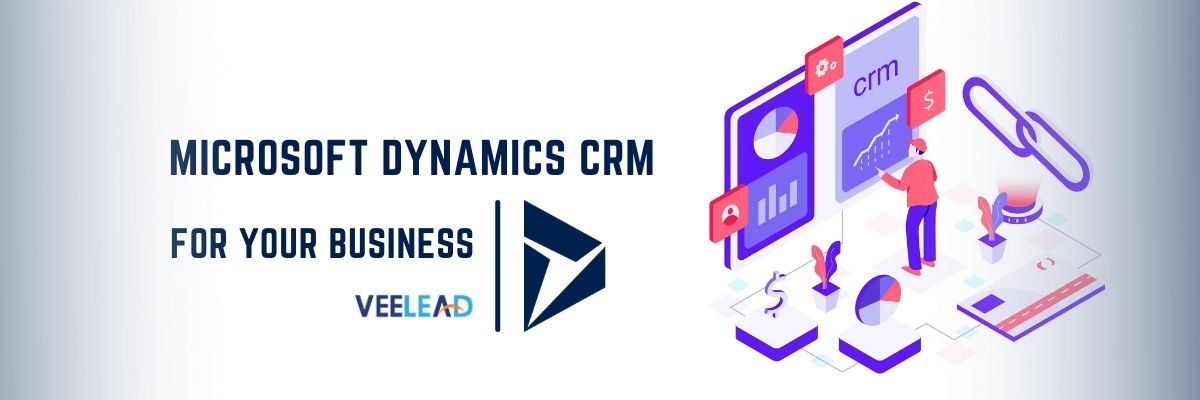

Microsoft Dynamics CRM
Coordinating the marketing, sales and customer service teams of the company is essential to deliver a better customer experience. Microsoft Dynamics CRM first developed in 2011 which is a highly flexible customer relationship management (CRM) platform that helps companies to provide a customer-centric experience and gain insight into the customers’ interests to build lasting relationships. Dynamics CRM is designed as a server-client app that also supports enormous web services.
Microsoft Dynamics CRM Online is transferring into Microsoft Dynamics 365. Microsoft had combined business applications, segregating the artificial silos of ERP and CRM in order to produce new applications in the cloud. The new built-in application will perform together to control and manage certain business processes such as sales, customer service, field service, operations, project service automation and marketing. Microsoft Dynamics 365 is developed to show the efficiency of One Microsoft.
Veelead provides Microsoft Dynamics CRM implementation services that transform your customer interactions and infuse your business with tools that boost sales and marketing levels, consequently helping in increasing revenue.
Benefits of Microsoft Dynamics CRM Implementation:
• Enabling targeted prospects for result-driven marketing campaigns, tracked results to test and improve promotions and offers..
• Enable Sales tracking such as lead to cash visibility, lead and opportunity tracking, streamlined approvals, and real-time sales forecasts..
• Empowering customer service tools to streamline escalations, improve knowledge sharing, and enable more effective account management.
Veelead’s Microsoft Dynamics CRM consultants will analyze your business requirements and offer strategically configured CRM solutions that will be tailored for your business purposes. Our consultants will ensure that you will be able to achieve faster and better results with Microsoft Dynamics CRM. We help you to utilize Microsoft CRM’s rich features and functionalities to improve profitability for your business and provide greater value to your customers.
Relationship Management is the core functionality of Microsoft Dynamics CRM. Customers’ touchpoints such as email/phone communications, appointments, letter exchange, faxes, etc., can be captured by the employees.
Top Three Modules in Microsoft Dynamics CRM:
1. Sales
Sales ideally relate to sell more and they are faster with Microsoft Dynamics CRM. Sales must be quickly adaptable and the solutions must be familiar, in-built and easy to adopt. To make customer interaction more relevant and meaningful, Microsoft Dynamics CRM Online has special access to social data that leads to lead generation and relationship management.
Your sales team can interact with anyone across the globe from anywhere and on any device. As mentioned lead generation, lead-to-opportunity conversion upon qualification, order management and invoice tracking features are part of Microsoft Dynamics CRM sales automation process.
2. Marketing
The main goal of Marketing is to attract, engage and retain the customers with Microsoft Dynamics CRM. Planning and executing the plan should be a key skill for marketers in this digital world. The right option is Microsoft Dynamics; it makes your customer engaged and makes them be aware of marketing vision life.
The goal is to have a customer’s life long, in order to maintain that, we need to cut down the time for marketing and improve brand consistency and message while the customers in need that make you achieve and execute your plan effectively.
3. Customer Service
Customers should be one of the important parts of any organization. Attending customers and helping them in resolving their issues should be a core responsibility for the organizations. Microsoft Dynamics CRM has customer self-service, which will help in increasing the SLAs.
You can connect with your customers from anywhere and on any device, which gives an on-time solution to the customers and helps in improving customer experience.
Technical Features of Microsoft Dynamics CRM:
1. Microsoft Dynamics CRM for Phones & Tablets
Microsoft Dynamics CRM has a mobile app, where CRM entities can access through mobile devices. You can access CRM data anywhere and anytime which in turn increases productivity. You can also customize the Microsoft Dynamics CRM app based on your requirements. The mobile app can be accessed offline.
2. Security Model & Roles
Data integrity and privacy are part of the security model in Microsoft Dynamics CRM implementation. There four major key features, they are as follow
• E-based security: A user or a team can leverage the role-based security to group sets of privileges together into roles describing the tasks that can be performed.
• Record-based security: This security can restrict user and team rights to modify the data on individual records.
• Field-level security: The field-level security can be configured to restrict access to specific businesses with high impact fields in an entity only to certain users or teams.
• Form-based security: This security can be developed to permit or restrict access to certain forms proposing relevant information to users or teams.
3. Reporting
Microsoft Dynamics CRM reporting feature influences the flexibility and robust SQL Server portfolio of products to create, analyze, process and extract reports. There are different ways to view the data using the features available.
Reporting Services in Microsoft SQL Server
SQL Server Reporting Services is a very useful reporting platform, which incorporates Business Intelligence dashboards and customer analytics through easy to use interface. Data is export from CRM by following the security policy and displays standard export options for next processing or distribution like PDF, TIFF and Excel.
• Report Wizard: This report can be accessed by CRM users to create a new SSRS report. This feature helps in summarizing data, create charts and tables, which can be easily printable.
• Advanced Find: This is a very powerful and productive feature. Any CRM users who want to use the visual Point and Click query tool to report on Customer data can access this feature.
• Export to Excel: As a result of the advanced find, the users can export the data to static or dynamics Microsoft Office Excel worksheet or PivotTable.
• Filtered Views: If you want to set up and run the report in a simplified way with high security, this feature would be the best option. This can be used with any ODBC compatible tool like Microsoft Query or Microsoft Excel.
• Mail Merge: This helps in merging the documents from a standard template using CRM interaction with Mail Merge option.
4. System Integration
There are two types of features in Microsoft Dynamics CRM, they are as follows:
• Software Development Kit (SDK)
• Application Programming Interface (API)
These features can be used to extend and customize the system to fulfill the unique business needs and connect with different technologies through web services. By following this, we can minimize cost and higher business functions in Microsoft Dynamics CRM.
5. Web API
Web API is introduced to Microsoft Dynamics CRM Online 2016 update. Web API can be used in a huge variety of programming languages, platforms and devices. This gears the OData – Open Data Protocol version 4.0 and OASIS standard, which is used for developing and consuming RESTful APIs.
6. Organization Service
Organization Service is also called “SOAP endpoint”, this service is available since Microsoft Dynamics CRM 2011. This web service is used by developers working with Microsoft Dynamics CRM and enhanced to perform with NET.
7. Microsoft CRM Portals
Microsoft Dynamics CRM and CRM Portal – ADX Studio are merged within Office 365 Microsoft Cloud. Microsoft had made it easy and simplified by merging them under the Microsoft 365 platform. CRM Portal modify Dynamics CRM into interactive, web-based sales, services, support and social engagement platform with multiple apps and pre-designed portal websites.
Our Veelead’s Dynamics CRM Implementation Services Include:
• End to end CRM Implementation
• CRM Version Upgrades
• Customization & Development Services
• Reports & Dashboard Development
• Data Migration & System Integration
• CRM Functional Design & Best Practices
Veelead also offers comprehensive post-implementation services such as ongoing support, upgrades and maintenance to ensure satisfied Dynamics CRM experience by our customers.
Contact us today to schedule a complimentary business needs assessment.


